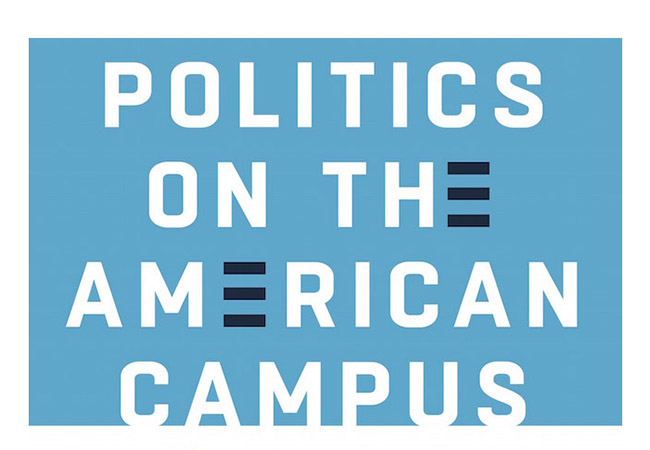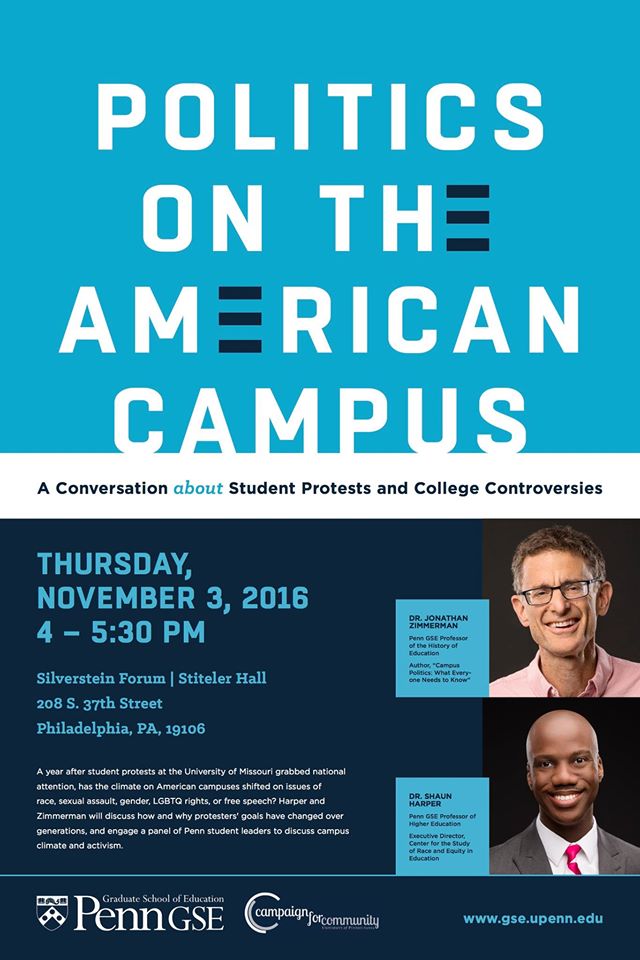A year after student protests at Missouri, Jonathan Zimmerman is still looking at the politics on American campuses

As he watched student protests unfold at the University of Missouri, Yale, and other campuses last fall, Penn GSE education historian Jonathan Zimmerman wondered: What makes this time different?
It’s a fundamental question for a historian, one that kept coming up as the demonstrations gained national attention, and student leaders were compared to 1960s campus activists. But as he researched his latest book — Campus Politics: What Everyone Needs to Know — Zimmerman found that while the pictures were similar, the debates at colleges had changed, with significant implications for free speech, student rights, and university responsibilities.
Where in the past students wanted college administrators to be more hands off, Zimmerman found protestors at Missouri and elsewhere wanted more administrative support for minority students, and a more active administration role in combating problems like sexual assault.

“I think what’s characteristic of this moment is that every reform, even reforms that are anti-administration, are actually requesting more of it,” Zimmerman said.
The way student protesters talk has also changed. Student activists regularly use the language of trauma in ways they didn’t in the 1960s.
Like his previous writing on subjects ranging from sex education to religion in public school curriculum — work that that established him as one of the foremost education historians working today — Zimmerman picks apart the intersection of social movements and educational institutions.
“Most of my work has been about arguments among citizens about what schools should do,” Zimmerman said. “Schools are the central public institution where we try to decide who we are and what we want to be.”
Zimmerman joined Penn GSE this fall after spending 20 years at New York University where he served as chair of the Department of Humanities and Social Sciences in NYU’s Steinhardt School of Culture, Education, and Human Development.
A former Peace Corps volunteer and high school social studies teacher, Zimmerman began his doctoral studies in history at Johns Hopkins University still passionate about education and the American educational system. Education was the natural subject for his research.
“I wanted to understand what I had been doing in the other years of my life,” Zimmerman said. “What were these institutions? Where did they come from? Most importantly, what different purposes did people invest in them?”
In addition to his scholarly work, Zimmerman has written for the New York Times, the Washington Post, the Philadelphia Inquirer, the Chronicle of Higher Education, The New York Review of Books, and The Atlantic. Zimmerman doesn’t see a distinction between his scholarship and his journalism. Both efforts, he said, are about trying to commute with people.
After a career focused primarily on the K-12 school system, Zimmerman is now also looking at college campuses.
Over the last 50 years, higher education has dramatically changed. Significantly more Americans now attend some form of higher education, and leaders across the political spectrum list college access and affordability among their goals. In many ways, Zimmerman said, college has become the latest “incubator for citizenship,” a role K-12 schools started to play under 19th century education reformers.
But for all the growth, little is known about how colleges have transformed over the last century from bastions for the elite to mass institutions. That, Zimmerman said, makes it difficult to really assess what efforts have been tried before and what might work in the future.
He’s just starting to study the history of college teaching, an area researchers have largely ignored. In his early investigations, Zimmerman has already found connections to a long line of student protests, including some of last year’s demonstrations.
“If you look at student demands, a lot of them were actually about instruction and instructional behavior,” Zimmerman said.
As he continues his research, Zimmerman hopes to uncover how many college teaching practices we now take for granted got their start. If his earlier work is any guide, the history won’t be as simple, or without controversy, as many would first assume.
